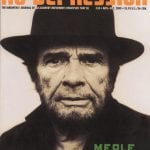Jim & Jennie & The Pinetops – Oh, the Horror
As a young girl, Jennie Benford would fall asleep to the strains of her father’s bluegrass band rehearsing in their Northern Vermont home. One night she awoke to a song she hadn’t heard before, the traditional murder ballad “Pretty Polly”. Benford lay awake, eyes wide open, scared to death.
“I must’ve been 6 or 7 years old, and the full impact of that song really hit me,” says Benford, who spent the decade that followed straying from the music she grew up with and into “a serious Led Zeppelin phase” before finding her way back to bluegrass.
“I’m sure it had nothing to do with the line ‘He stabbed her in the breast, her heart blood did flow,'” laughs Jim Krewson, Benford’s singing partner and co-founder of their bluegrass quartet Jim & Jennie & the Pinetops. The group formed in 1997 while the two briefly resided in New York City; they’re now based in Bucks County, Pennsylvania, where Krewson grew up.
Krewson’s introduction to bluegrass also came courtesy of his father, but was slightly less terrifying. During a family trip to Nova Scotia, he and his dad grappled over the car stereo. “I wanted to hear Adam & the Ants; he insisted on Flatt & Scruggs,” he recalls. Though Krewson went on to play in numerous punk bands, something about his father’s records stayed with him. “I think it was the energy of the music,” he says. “And the distortion, the way everything sounded like it was recorded so hot.”
The same recording philosophy is audible on Jim & Jennie & the Pinetops’ second album, Little Birdie, a joint offering from the Plowshare and Overcoat labels. (The first was released under the name Pine Barons, which they abandoned to avoid confusion with another bluegrass group of the same name.) Benford and Krewson’s slightly acerbic, high lonesome harmonies, built on Benford’s keening vocals, soar and buzz as they wrap around each other. Banjoist Brad Hutchison alternates between jagged, Scruggs-style ferocity and gentle, circular picking. Songwriters Benford and Krewson trade licks on mandolin and guitar, respectively. Upright bassist Brendan Skwire drives the band’s syncopated rhythms, doing the job of both bass and drums.
The album is so energetic and raw that at times it’s easy to forget the quartet is all-acoustic. Produced by Thom Monahan (of the Pernice Brothers) and mixed at J Mascis’ Western Massachusetts home studio, Little Birdie has a strong rock undercurrent beneath its traditional songs.
The Pinetops’ versions of the Delmore Brothers’ “Heavenly Light”, the Carter Family’s “Cannonball”, and Hazel Dickens’ “Won’t You Come And Sing For Me” that appear on Little Birdie are re-created with the band’s love of old records by folks such as the Skillet Lickers and the Blue Sky Boys, but are performed with delightfully unfastened enthusiasm. Benford and Krewson’s originals sound traditional, but a closer listen reveals a twist on conventional bluegrass lyrics. In Benford’s “The Old Wood Mill,” townies get drunk and dance as they watch a mill burn to the ground. Krewson’s “This One’s On Me” finds a broken-hearted man smoking pot to the point of unconsciousness and pouring out his sorrows to a lesbian.
It’s not because of their lyrics, though, that the band tends to play more rock clubs than bluegrass festivals. “The bluegrass circuit is hard to break into,” says Benford. But at the rock venues, even folks who’ve never seen a bluegrass band fall in love with the Pinetops.
“I think people want to be knocked out by something they haven’t heard before,” Benford explains. “They see us go up there with acoustic instruments and huddle around a single microphone, and they don’t expect this intense, fast, piercing music, and the level of sound. It’s the spectacle of the whole thing, sort of like experiencing your first rock show.”




